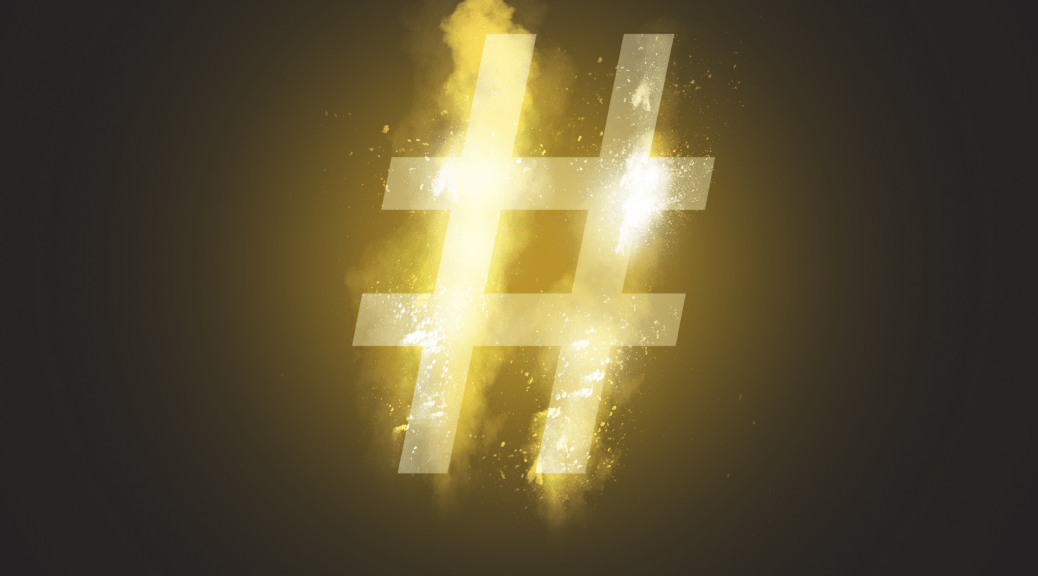
What’s in a Hashtag? #DefundThePolice and the Politics of Interpretation
It’s been coming up a lot lately. People will ask me, as someone who specializes in communication studies, what I think about the #DefundthePolice hashtag. The implication is always that if the movement just marketed itself better people would be on board. OR people will show willful misunderstanding of the movement in their response to similar matters, as a troll on the AS FB page did earlier this week. The present article will unwrap the communication dynamics behind these kind of interpretations of #DefundThePolice for better understanding of the politics of interpretation that happen with this kind of movement. All of this will help us identify unhealthy knee-jerk responses that ultimately defend and reinforce white supremacy, and figure out how to respond better.
My Cred
So, first, as I implied above, I am THAT kind of doctor—which is to say that I have a PhD in Communication. As part of my job as THAT kind of doctor, I start teaching again soon (all online this fall, if you were wondering—incredibly thankful for that).
I’m also white, and therefore on my own journey to uncover and combat my own white supremacist socialization. Writing this blog piece is part of that–and probably not a perfect part (note I talk about how expectations for perfection tend to reinforce white supremacy toward the end of this piece). I hope my Black friends and followers will let me know if there are ways they needed their voice better heard in this piece.
The Topic at Hand
Starting a new semester always pulls me back to basics in a useful way, and so I’m taking a short “break” this week from the intense rhetoric of conspiracy series I’ve been working on (you can find it here, here, here, and here) in order to address issues I’ve seen popping up around the #DefundThePolice hashtag and its politics of interpretation.
Writing this article reminds me of writing the one on Kaep and the politics of respect, and that alone should tell you something—because fears and/or insistence about this hashtag “not being enough” all ties back to racism, as that did. Hang in there for a few minutes. I promise I’ll explain why and how.
How Communication Works
But first, let’s go to the basics of how communication works and doesn’t work, including in the case of hashtags. See, communication is always arbitrary in meaning until both the author and the audience, often in light of a broader interpretive community, have their say about what the words actually mean.
If you read (or listen to) an interesting book like Word by Word: The Secret Life of Dictionaries by Merriam-Webster editor Kory Stamper, you’ll discover that a careful process goes into figuring out which words and meanings end up in places like dictionaries. (I encourage you to check it out if you’re interested. It’s really well done.)
Communication Is Never Static
The point here is that the meaning of communication is never static, set in stone, put into the words and living there, ready to be unwrapped like a package at Christmas.
On the contrary, the meaning of communication is fluid and dynamic and often full of conflict and power struggle.
The Most Important Questions in Most Communication Situations
This is why communication theorist John Durham Peters says the following in his excellent book Speaking into the Air: “The question should be not Can we communicate with each other? but Can we love one another or treat each other with justice and mercy?… At best, ‘communication’ is the name for those practices that compensate for the fact that we can never be each other….We ought to be less worried about how signs arouse divergent meanings than the conditions that keep us from attending to our neighbors and other beings different from us.”
The Politics of Interpretations
All of which brings us to the politics of interpretation. From symbolic acts like kneeling (which I covered earlier) to hashtags like #DefundThePolice, the question of who gets to define what something means often becomes a political battleground in ways that don’t always make logical sense—and too often work against justice and mercy on those who are vulnerable and oppressed by viscerally defending unhealthy systems like white supremacy.
Unpacking Moral Disgusts Backing White Supremacy
How can we tell when illogical power dynamics are at play, especially ones that are seeking to reinforce white supremacy or racism?
Well, like I’ve been saying on this blog, looking for reactions that arise from moral and political disgusts is really helpful. (I had a series about this starting here.) In short, when people have a strong immediate reaction as though something is distasteful or immoral to something, there’s a good chance that they are operating out of “moral disgust” rather than logic.
NOTE: This isn’t always a bad thing, when your moral disgusts are about toxic patterns of behavior and systems. It’s unhealthy when it’s scapegoating others while defending toxicity, though. And we all get socialized into unhealthy patterns and systems, so it can take a lot of work to shift our moral disgusts in healthier directions. And sometimes we’re doing some of the right thing and still immersed in some of the toxic stuff, so it gets complicated.
What Happens When We Have Moral Disgusts
When people caught up in moral disgusts, they are too often seeing the “disgusting” object (which is often opposing their deeply held beliefs) as a threat. In other words, something to either fight or run away from. Certainly not something to stop and question and dialogue with.
This is, quite frankly, a lot of what I see happening with the #DefundThePolice hashtag, as I did with the kneeling. What often is happening behind these kinds of political disgusts is a logic of false dichotomy, specifically of the type that set up god terms to be defended at all costs in opposition to devil terms, to be fought at all costs. (I talked about the definitions of these things more in a series that starts here.)
There’s also a lot of perfectionism around “if we just could get the weight of this hashtag to perfectly stave off the bullies.” I’ll get to challenges with that in a bit.
Moral Disgusts Regarding Movements that Speak Up for Black Lives
In both the cases of people’s strong knee-jerk reactions (without research) to #DefundThePolice and to Kaep’s kneeling, we can see the same form of moral disgust and god term/devil term pairing going on under the surface.
That’s because both of these movements have been seeking to speak up for the right of black bodies to receive due legal process and healthier, less violent handling when they come into contact with police bodies.
We’ve All Been Socialized into Systemic Racism, So It Can Happen to Us
This advocacy is needed because we’ve all been socialized into systemic racism, which means our moral disgusts have been too quick to react in what I defined last week as hypervigilant ways when we see black bodies.
In short, regrettably, our knee-jerk impulses, as bias tests and other statistics have proved (look it up! There’s a lot out there about this!), tend to think of darker skin as more suspicious and more worthy of receiving immediate punishment without due process.
How We Come to Defend White Supremacy at Black Lives’ Expense
As a corollary, without careful retraining, our knee jerk impulses, when seeing a symbol like Kaep’s kneeling or a hashtag like #DefundThePolice, we tend to think of advocacy of causes surrounding black bodies as less worthy of being given a hearing.
Even those of us who are allies may think that the hashtag has to speak on its own–because surely no one will take the time to research, right? (That’s a problem, because we can and should expect better of ourselves and others, and push back against such assumptions that a legitimate policy idea ought not receive a hearing on its own terms.)
Similarly, police and their authority are often the other pole of our associations—the authorities that we too easily see as doing no wrong in our societies (and too often we think they deserve unlimited PR space with too little accountability).
Along with this, white people see themselves as “surely not racist,” because if we put “racism” as something extreme that only really bad people do than none of us can fit that definition, right? (Sigh. Definitely a problem when we start seeing ourselves as faultless god terms. Really unhealthy, that.)
Defense of the Police and Unhealthy Cordial Hypocrisy
Anyway, it should be clear to careful readers of this blog that police don’t necessarily bring good conflict management. Police brutality aside, even (and that’s a huge burden to shift to the side, even for only a few seconds!), police are historically associated with “keeping the peace,” a phrase which is dripping with cordial hypocrisy.
As I explained in my first toxic sides of Christian Nice piece on this blog, cordial hypocrisy is a situation in which things seem peaceful outwardly, but under the surface resentment is simmering and bound to burst out sooner or later specifically because things are such that one side isn’t given a hearing, for whatever reason.
Cordial hypocrisy is premised on the idea that if we all just gaslight ourselves and others long enough (in other words, ignore the facts of the problems), very real problems will somehow just disappear and we’ll never have to deal with them.
The Link Between Nice and Support for White Supremacy
As many have noted (MLK started my thinking about it, but the way Ta-Nehisi Coates talked about it in Between the World and Me brought it most home to me, personally), white supremacy’s existence is at least in part premised on this kind of gaslighting of the very real ongoing problems of racism—which is how Christian nice supports white supremacy so unfortunately well, as I discussed here, here, and here.
In the terms I’ve been discussing here, that means maintaining strong moral disgust reactions to people speaking up against injustices toward black bodies, including movements that seem to attack the status quo in this area.
What Does Support of White Supremacy Look Like in Practice?
This system of injustice is reinforced by people defending as automatically moral those authority figures that maintain the system of white supremacy by seeing black bodies as less valuable, more suspicious, and less worthy of time to prove themselves through due process (and good representation).
Anyway, so the point is that all of these visceral things are at play when many people, especially white people, see someone, especially a Black person, kneeling during the national anthem or see a hashtag like #DefundThePolice.
Unpacking these Viscerally Racist Reactions
In both cases, the person sees the word or action and too often sees the status quo being challenged by those who are often judged to be less worthy of a hearing–and feels that to be a problem. (Sees it to be aggression rather than the assertiveness it is.)
In short, in such situations a societal hierarchy based on oppression is being challenged. And those who have been trained to uphold that hierarchy—see its stability as a matter of maintaining their own status—tend to feel that, and seek to either defend that hierarchy through fight responses or defend that hierarchy through refusing to listen to the points of view that would challenge it—through flight from the issue.
How Fight and Flight Combine Toward Fighting Protest on Behalf of Black Lives
The flight from dealing with the issue often comes through refusal to do what one would normally expect to do when encountering a new idea, if one is to be just to that idea—look up more context and definitions about what that idea means more fully, and give those ideas a hearing before setting down judgments about the matter.
And—to bring us back full circle to the examples I was talking about at the very beginning, the fight mode often combines with this flight mode in either an openly aggressive or passively aggressive fashion.
In short, people, to defend the white supremacy power structure that’s embedded in our moral disgusts, people pick on the acts of protest—their wording, their respectfulness—as a way to distract from the fact that they’re defending authoritarian white supremacy.
Linguistically Aggressive Defenses of White Supremacy
See, many can’t see themselves as defending white supremacy, so they offload that onto slogans like “blue lives matter” that were created to oppose ones like “black lives matter.” (As though Blue Lives don’t already matter enough to have a lot of power and to be hidden behind intense firepower and a blue wall.)
And many can’t see themselves as defending white supremacy, so when they see policy suggestions like #DefundThePolice in hashtag form they start talking as though it’s suggesting the police be abolished rather than defunded, suggesting extreme visions of lots of lawlessness if funding is shifted away from more violent means of curbing a community that’s seen to be suspicious to gentler methods.
Sometimes It’s Subtler, Though
Sometimes it’s not that obvious, though. Sometimes it comes when others who have accepted the problem as set forth by critics (sometimes even those who would like to be allies of Black Lives!) act as though a hashtag on its own needs to be Jesus in the guise of Superman. What I mean is that these folks look to a hashtag, with no further explanation or research, to leap over centuries-old neurobiologically-embedded moral disgusts and fight/flight reactions in a single bound.
The thing I’m trying to say here is that words and language and communication, was never designed to bear that kind of burden of perfection in any situation. This is even MORE the case in situations where centuries-old socializations need to be overcome to achieve actual justice and equality in how people are treated.
But It’s Not About the Words—It’s the Justice and Mercy
To sum up, buying into the bullies’ argument that the hashtag #DefundThePolice ought to be fully able to take down all opponents with a single glare of its “The” is a support of white supremacy, however small.
Because, as Peters said above, it’s not about the efficacy of our communication, but whether we’re loving each other well. And in the case of good policy, it’s not about whether it’s perfectly sold in a hashtag, but whether it provides more justice and mercy and due process in the solution than the status quo does—in short, whether it comes closer to fixing the problem.
What to Do If You Have Lingering Questions About #DefundThePolice
So if you want to see whether #DefundThePolice is a good hashtag leaning toward good feasible policy, I strongly recommend you read up on the proposed policies and listen carefully to what’s being proposed.
You’ll know whether the it’s a good policy if it solves problems and creates more equity—and if you have knowledge that can make the ideas better based on expertise (I doubt these ideas are perfect, and they don’t really have to be), well, join on in the dialogue to create a better policy! (But listen carefully first! And take the ideas you find there seriously before you jump in.)
(Speaking of Jesus needing to look and act like Superman, it should be clear that if something is defending the authorities over and against the least of these, well, you might not be defending Jesus OR equality.)
How to Respond When People (Including You) React in Knee-Jerk Ways to Ideas
So how can we respond healthily in these kinds of situations when symbols or hashtags aren’t being given a fair shake because of white-supremacy-based visceral prejudice?
I have lots of ideas, so I’m going to recommend you sign up for the email newsletter in the top bar and read the free “Guide to Online Trolls” that comes in the final welcome email once you’ve confirmed your email address. Some people will be educable and some won’t, and the guide to trolls helps you distinguish the difference.
One Final Note: Better Together
I’ve noticed that often followers to Assertive Spirituality come expecting words, slogans, hashtags and memes to bear the weight of Superman. None of the things the site offers can remotely bear that weight.
The thing is, that’s okay–because it’s not about the single words, or single memes, or single hashtags or even a single human doing things alone. That’s not how communication or life works.
Instead, it all goes better when it’s about a bunch of words and sentences and people all working together. Moving into this difficult fall season of continuing pandemic and difficult election, let’s work to help each other remember that, shall we? We’re stronger together–and we don’t have to stand alone, even when we’re healthily isolating. 🙂
A Final Charge
Go team #AssertiveSpirituality! Let’s continue to do what we can where we are with what we’ve got to identify and continue to fight unhealthy systems of oppression wherever we find them toward a healthier world for us all. We can do this thing.


2 thoughts on “What’s in a Hashtag? #DefundThePolice and the Politics of Interpretation”
Greetings, Professor!
Toward the end of this article, in the section marked “But It’s Not About the Words…,” I find that first sentence difficult to understand, most particularly “…with a single glare of its ‘The’….” Can you expand on the idea you’re trying to put across please?
Ahhhh! I was being overly clever, most likely. I was pretending the hashtag was a superhero like Superman and pretending that the smallest word in the hashtag (which is “The”) could take down all the bullies’ strong reactions with a single glare (imagine #DefendThePolice as a cartoon with a cape, with “The” coming out as daggers to knock down white supremacy). Hope that clarifies it for you. Cheers, DS Leiter